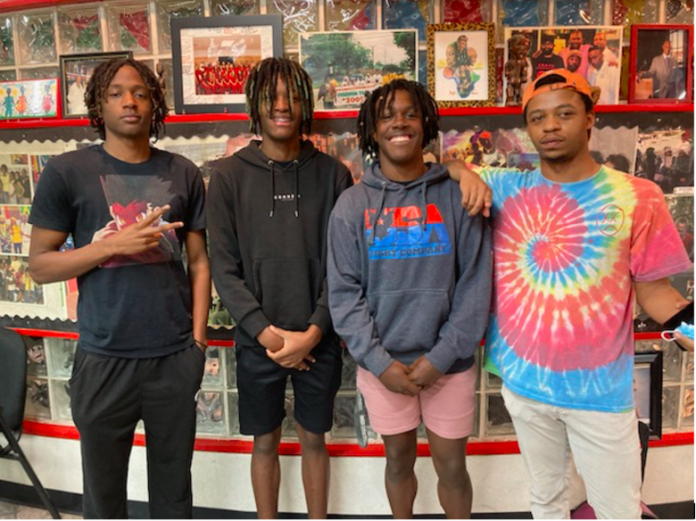
By Laura Onyeneho,
As the countdown to another presidential election season, the role of Black voters has become increasingly critical, especially in determining key outcomes, including the U.S. presidency.
However, emerging trends suggest a troubling decline in voter engagement among young Black voters. According to a Harvard Youth Poll, fewer voters under age 30 plan to vote in the upcoming presidential election than did at this point in the 2020 election cycle.
Less than one-third of those identifying as independents plan to participate. This potential decline in participation could significantly impact President Biden’s chances in a hypothetical rematch against former president Donald Trump, given Biden’s stronger support base among young voters.
Jan Leighley, a political scientist at American University, advises caution, noting that for young voters, especially those aged 18 to 25, it’s still too early to be heavily focused on the election.
“The Democratic convention is a month away, but it’s really early before the election. They’re not paying attention to the campaign. They will be the last to make any decisions,” she says. “They have fewer experiences to anchor them, and they haven’t tuned in yet.”
She adds that for young Black voters, this election is a moment when the Civil Rights generation is aging out. Additionally, young white people often have more access to resources and support for major life changes, such as getting a job, getting married, and having children. This gives them a better chance at success. “It’s going to be the whites,” Leighley says. “So, in terms of the uncommitted, that’s an important part of those differences.”
Recently, there has been significant focus on Biden’s loss of support among Black voters, who played a crucial role in his victory over former President Donald Trump in the 2020 election. This concern extends to younger Black Americans, who seem unmotivated by the president’s message.
Despite Blacks generally supporting Biden’s policies like student debt relief, gun control, and abortion access, the economy and inflation remain top concerns among younger adults. Even with Federal Reserve data showing significant improvements in these areas, the overall lack of commitment among young people in the U.S. News-Generation Lab poll may be tied to general dissatisfaction with both Biden and Trump, raising questions about their participation in the election.
Why the Apathy?
To understand the root causes of this voter apathy, it is essential to delve into the attitudes of Black youth regarding their role in democracy and how these perceptions influence their political activities and ambitions. The Defender spoke with four young Houston-based residents who shared their thoughts about why they won’t be heading to the polls.
Attitudes Toward Democracy
For many Black youth, the promise of democracy has often felt unfulfilled. Historical disenfranchisement, systemic racism, and ongoing social injustices have fostered a sense of skepticism and disillusionment.
Carnell Mendoza, 18, is not registered to vote and doesn’t plan to any time soon.
“I don’t see how my vote will change anything. It’s a scam,” he said. “The people running for office aren’t great candidates, so I feel like it’s a waste of time.”
He graduated from KIPP Sunnyside High School and volunteered at SHAPE Community Center over the summer. Mendoza said that it wasn’t prioritized when it came down to learning about current events and understanding the political process.
“They don’t teach us that much about voting,” he said. “I feel like there needs to be more effort with helping young people understand the system better.”
The attitudes of Black youth towards democracy significantly influence their political activities. While some remain disengaged, others have shifted their focus from traditional political participation to grassroots activism and community organizing.
Larrin Williams, 18, said his reason for not voting is religious.
“God should really be the only person to think about and to guide us,” Williams said. “There’s no higher power than God.
Williams recalled when a friend registered to vote and participated without proper research into the candidates and what they stood for. Instead, his friend voted for the trending candidate at the time.
Knowledge Barriers and Systemic Obstacles
There is still a notable lack of representation of young Black individuals in political office or as candidates. The barriers to entry into politics—such as financial constraints, limited access to influential networks, and systemic discrimination—discourage many from pursuing political careers. Without role models or visible pathways to leadership, the political ambitions of Black youth remain stifled, and so do the voices of those who choose not to.
Voting isn’t the first thing on Osahoar Rikondja’s mind. What matters to him is being able to relate to a candidate who aligns with his values and ideas. However, politics is a game to him, and marginalized communities are losing.
“It’s hard to trust what you see on billboards and in the news,” he said. “The people who are voted in end up doing absolutely nothing, or they switch up on you when they get elected.”
He hopes that more young people consider running for office so that candidates represent that demographic of potential voting registrants. One of Black youth’s most significant barriers to political engagement is the lack of access to comprehensive civic education. Many young people are unaware of the importance of their vote, the workings of the political system, or how to engage effectively in the electoral process.
Additionally, systemic obstacles such as voter suppression tactics—strict ID laws, purging of voter rolls, and limited polling stations—disproportionately affect Black voters. These barriers hinder their ability to vote and contribute to a sense of disenfranchisement and powerlessness.
“I don’t like going to the polls. I hate waiting in line, and I don’t understand how this process works,” said Gabriel James, a 26-year-old Houston Community College alum. “I don’t know how things work and how my vote counts in this process.”
This post was originally published on Defender Network



